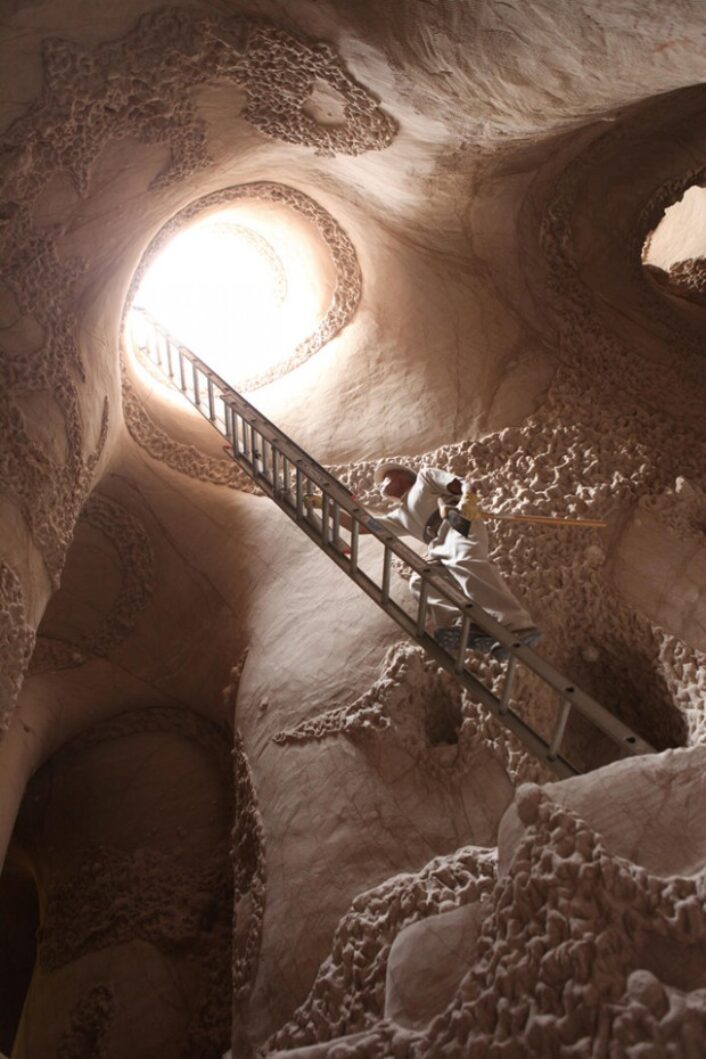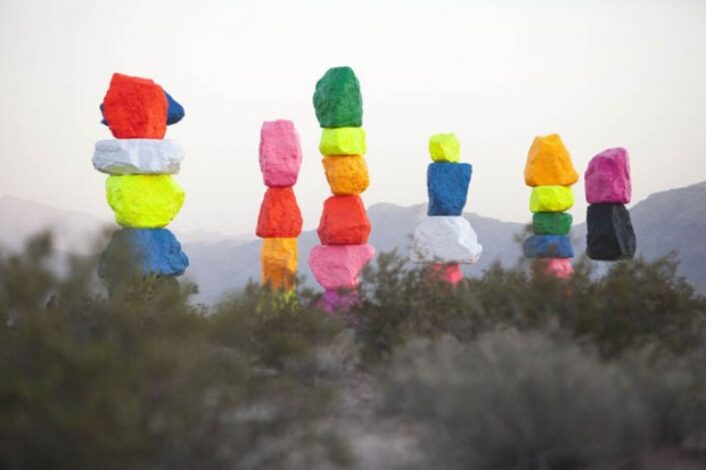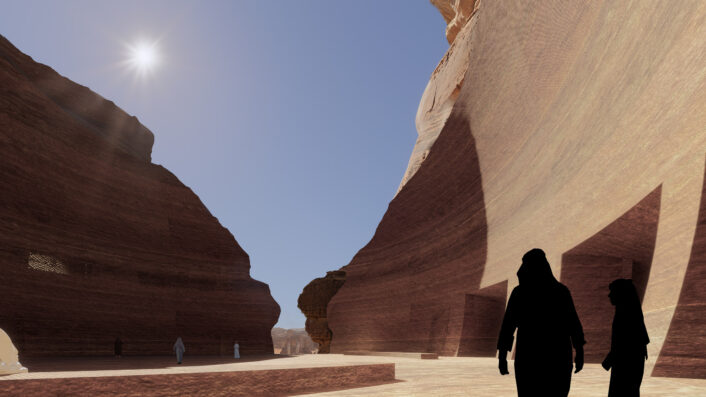Culture
Desert X AlUla 2022
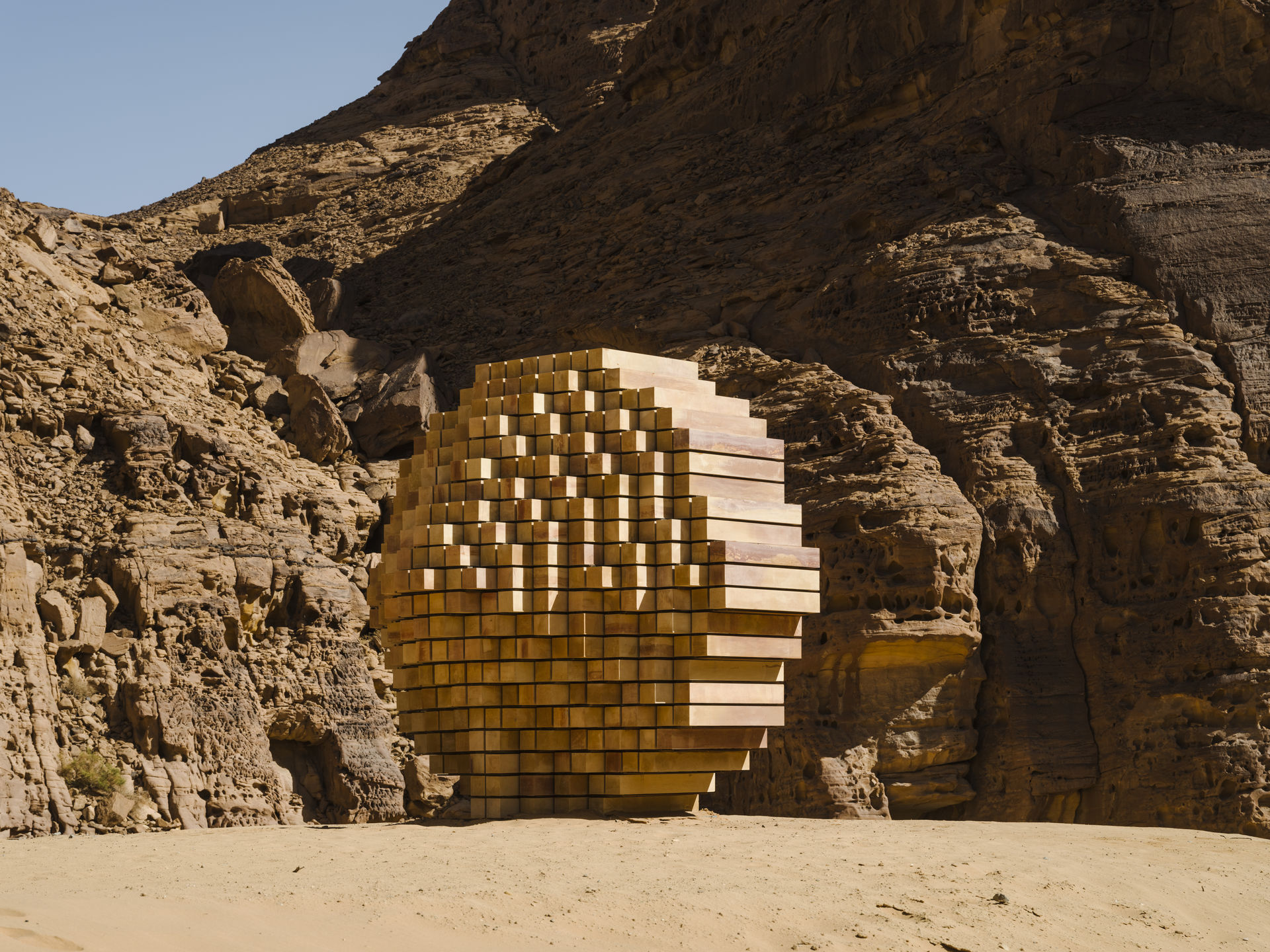
“Where The Dweller Lay” is an installation by Dana Awartani. The artist sculpted a concave geometric sculpture inspired by the Nabatean tombs; the installation also mimics the shapes of the surrounding geography.
Image courtesy of: Architectural Digest Middle East
Earlier this year, the 5th iteration of Desert X took place in Saudi Arabia. Called Desert X AlUla, the exhibition took place in the country’s globally significant ancient desert region. The hope is that this exhibition, and others like it, will bring visitors to desert locations through site-specific installations put on by international artists.
Produced by The Desert Biennial, the non-profit organization funded in California, the group’s (courtesy of Desert X web site), “guiding purposes and principles include presenting public exhibitions of art that respond meaningfully to the conditions of desert locations, the environment and indigenous communities; promoting cultural exchange and education programs that foster dialogue and understanding among cultures and communities about shared artistic, historical, and societal issues; and providing an accessible platform for artists from around the world to address ecological, cultural, spiritual, and other existential themes.”
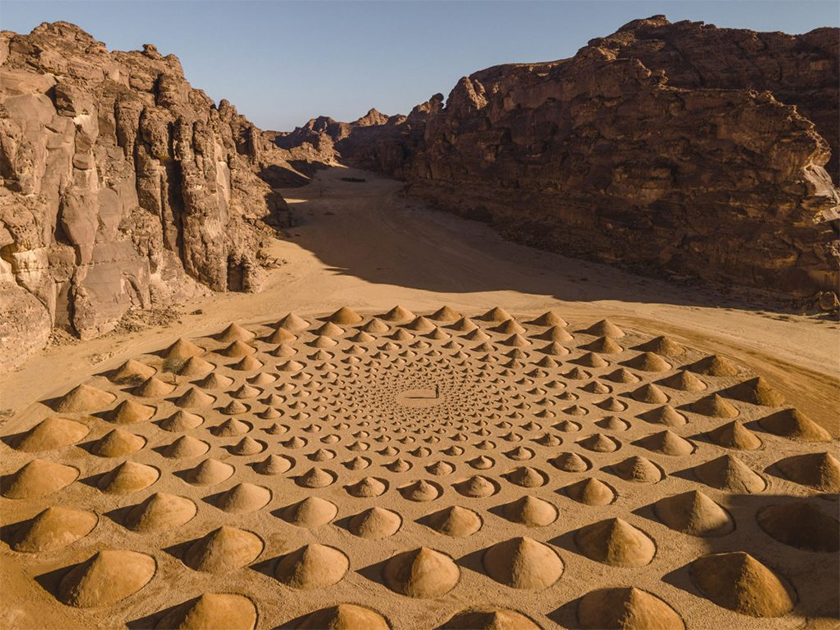
“Angle of Repose” by the land artist Jim Denevan invites spectators to experience the minuteness of ourselves within the vastness of the all encompassing desert.
Image courtesy of: Architectural Digest Middle East
Desert X first debuted in 2017 with sixteen diverse artists that created works for locations in California- from the Whitewater Preserve to Coachella. The exhibition was heralded for its unique nature and purpose, each representing artist received great acclaim and positive publicity. The following year, eighteen artists displayed installations near the Salton Sea. Even though the location was near Coachella, the geography was substantially different than that of the previous year. In 2020, Desert X was held in Saudi Arabia; the hope was to bring artists from across the region together. In addition to Middle Eastern artists, European and American artists contributed impressive works.
Desert X AlUla in 2020 was the first exhibition of its kind in Saudi Arabia. The site-responsive exhibition presented a wonderful exploration of desert culture from different perspectives. The organizers hope to create a “cross-cultural dialogue between artists from Saudi Arabia and its surrounding region and artists from serious iterations of Desert in California, taking its cues from the extraordinary landscape and historical significance of AlUla.”
Desert X 2021 was not cancelled due to the pandemic, rather, the exhibition presented twelve works for that addressed the global pandemic and the racial and political protests that were front and center the entire year.
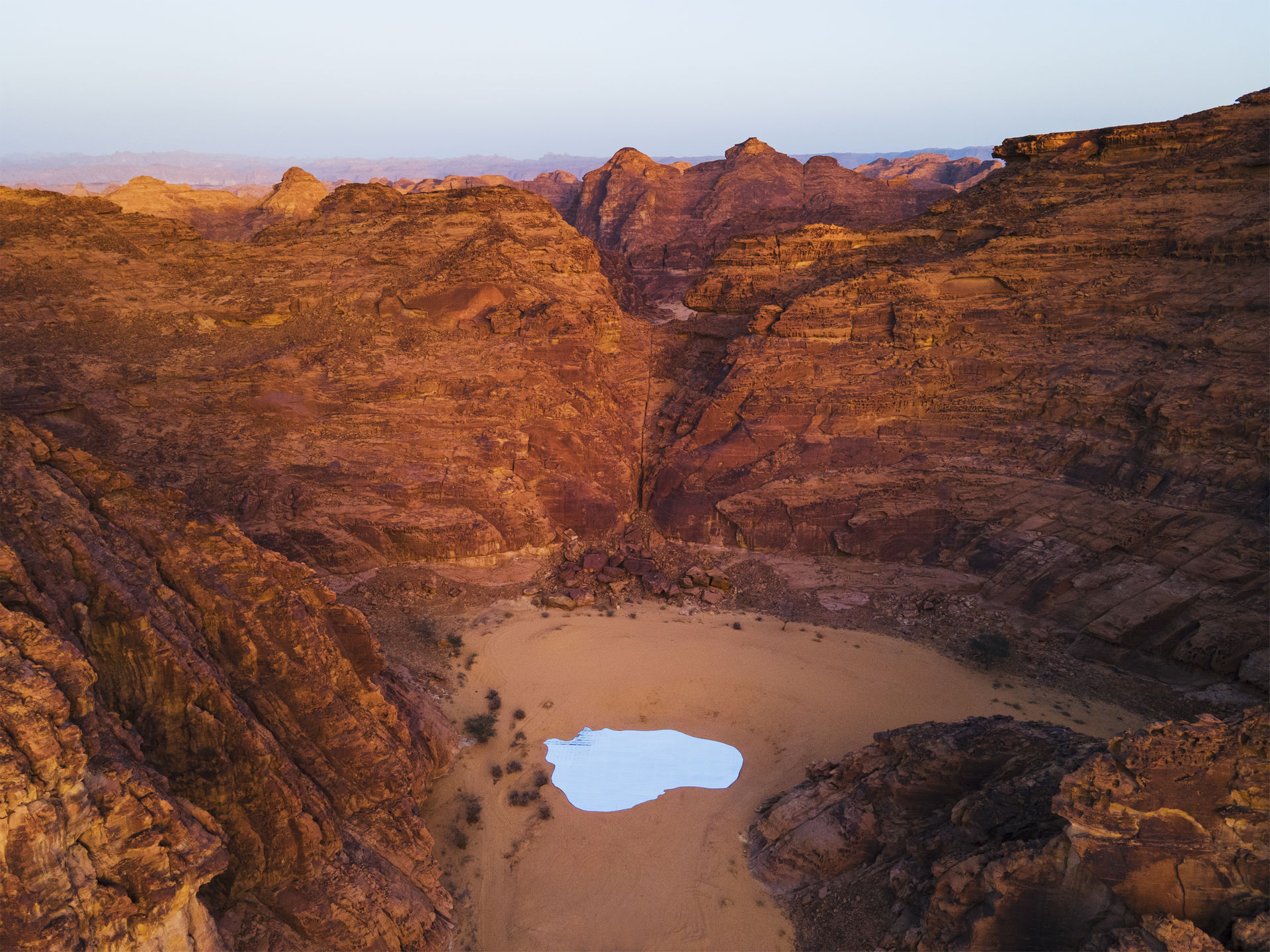
The Saudi artist, Abdullah AlOthman, placed reflective steel plates in a valley in an attempt to recreate ancient civilizations’ first experiences of a sarab. The desert’s rose-gold hued rocks surround the installation; as such, the body of water alternates between looking like the sky or as an illusion of water as the sun passes above.
Image courtesy of: Architectural Digest Middle East
The mystical exhibition was wonderfully curated by Reem Fadda, Raneem Farsi, and Neville Wakefield. With the goal of offering visitors an opportunity to interact with art in nature on such a vast scale; the dialogue was injected with so many new variables. Courtesy of Architectural Digest Middle East, Fadda said, “Under the theme of ‘Sarab’, the artists presented in the exhibition – all of whom have spent time in the region – have developed ambitious and strikingly innovative, responses for Desert X AlUla 2022, all of which address profound issues, that emerge from the local context but also resonate with audiences the world-over.”
This year fifteen artists were asked to participate in the site-specific exhibition. One requirement was that they completely familiarize themselves with the area. AlUla’s soil is fertile due to the region’s abundant groundwater. As a result, there is evidence that numerous ancient civilizations settled in this unique environment. Not too far away is the 2,000-year-old Nabataean city of Hegra, the country’s first UNESCO World Heritage Site.
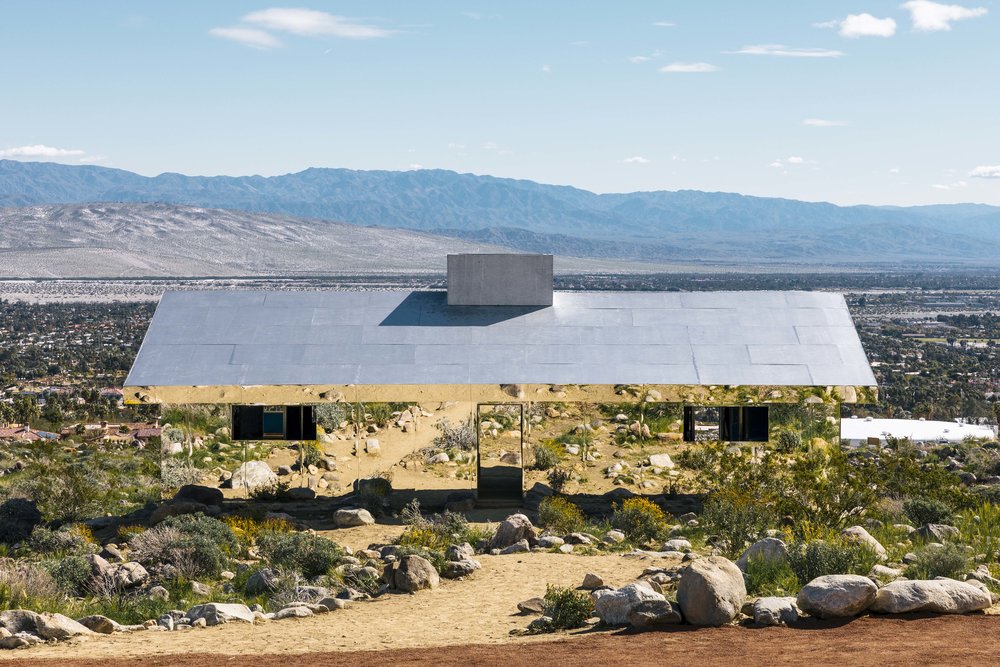
Doug Aiken’s “Mirage” from the 2017 Desert X. The ranch style house is entirely clad in mirror… both absorbing and reflecting the surrounding landscape.
Image courtesy of: Desert X
The idea behind Desert X is the brainchild of Susan Davis. In 2016, Davis, a former New Yorker who had been living in Palm Springs for six years realized that the Palm Springs Art Museum was not receiving the recognition it deserved. A trip in 2014 to BIACI, the biennial in Cartagena, Colombia, was the catalyst. Courtesy of Los Angeles Times, Davis said, “I realized that a similar project would be a way for people visiting the desert to explore its multilayers. There’s been a lot of attention paid to the artists in the high desert and not as much in the Coachella Valley. I felt it would lend some heft to what was already going on here.”
Enlisting the British-born New Yorker Neville Wakefield was vital; he was no stranger to staging outdoor exhibitions. In 2014, Wakefield curated “Elevation 1049: Between Heaven and Hell,” a site-specific biennial in Gstaad, Switzerland. He explains, “I have an interest in seeing how art behaves in unbounded spaces. And seeing how art can draw new audiences as a result of being in those spaces.”
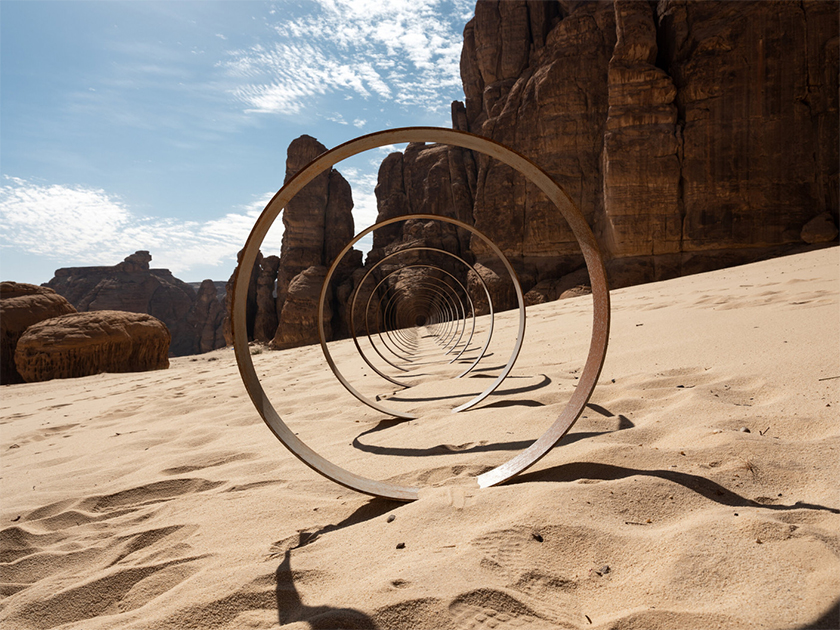
“Steel Rings” by the Lebanese artist, Rayyane Tabet. The installation is one part of his series, “The Shortest Distance Between Two Points.” Tabet explores the history of the Trans-Arabian Pipeline which took oil via land from Saudi Arabia to Beirut between 1950 and 1983.
Image courtesy of: The New York Times, photographed by: Lance Gerber
Each iteration adheres to the same presentation in that the desert presents a large, blank canvas for creators to create. Part of the beauty is that these yearly events are substantially smaller than typical biennials; usually between ten and twenty artists exhibit. The intimate size is certainly a distinguishing factor among bigger biennials. Wakefield adds, “We’d rather do fewer significant works than have a larger, scattershot effect. If you’re asking someone to drive for 40 minutes to find a piece of work, you want to reward them for their effort.”
For the fourth time, Desert X will take place in the Coachella Valley in 2023. A new curator will surely bring a slightly different perspective to the evolving biennale. Diana Campbell will now head up the exhibitions; the Princeton-educated American curator had been working in South and Southeast Asia since 2010. Campbell will definitely add to the 1.25 million visitors that have already attended the organization’s three previous exhibition in The Golden State!
